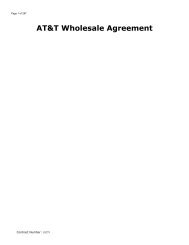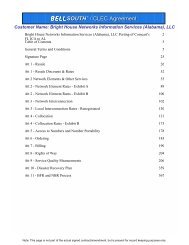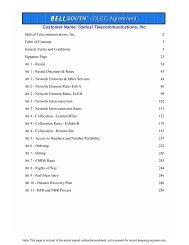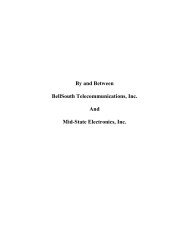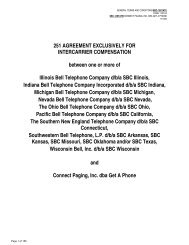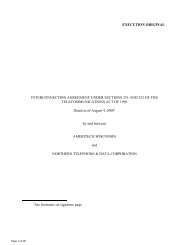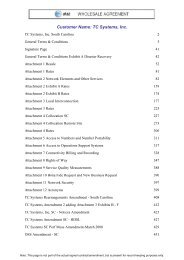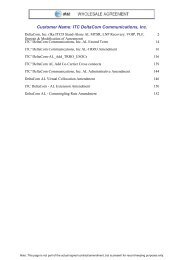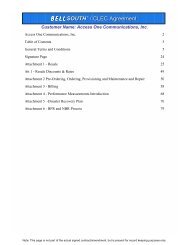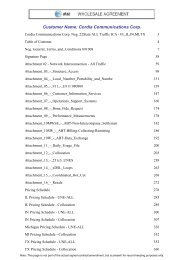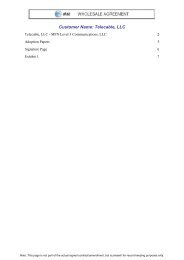AT&T Wholesale Agreement - AT&T Clec Online
AT&T Wholesale Agreement - AT&T Clec Online
AT&T Wholesale Agreement - AT&T Clec Online
Create successful ePaper yourself
Turn your PDF publications into a flip-book with our unique Google optimized e-Paper software.
Page 7 of 94<br />
General Terms and Conditions/AT&T LOUISIANA<br />
Page 6 of 46<br />
Cricket Communications, Inc.<br />
Version: 2Q09 – Two-Way CMRS ICA - Wireless – 05/05/09<br />
common switch point whereby other switches, both Tandem Office Switches and End Office Switches, may<br />
exchange calls between each other when a direct Trunk Group is unavailable. The term “Tandem Office”<br />
and “Tandem” are used to refer to the building in which the Tandem Office Switch resides, but are also used<br />
interchangeably to refer to the switch within the building.<br />
2.60 “Charge Number” means the CCS signaling parameter that refers to the number transmitted through the network<br />
identifying the billing number of the calling party.<br />
2.61 “Claim(s)” means any pending or threatened claim, action, proceeding or suit.<br />
2.62 “CLASS Features” (“Custom Local Area Signaling Service Features”) means certain Common Channel Signaling<br />
based features available to End Users, including: Automatic Call Back; Call Trace; Distinctive Ringing/Call Waiting;<br />
Selective Call Forward; and Selective Call Rejection.<br />
2.63 “Commercial Mobile Radio Service(s) (CMRS)” means As Defined in the Act and FCC rules.<br />
2.64 “Commission” means the Louisiana Public Service Commission (PSC).<br />
2.65 “Common Channel Signaling (CCS)” means or refers to a network architecture that uses Signaling System 7 (SS7) to<br />
transport supervision, alerting, addressing and controls signals, and data messages between Telecommunications<br />
nodes and networks during call set-up and tear-down, utilizing Signaling Transfer Points (STP), Service Switching<br />
Points (SSP) and Signaling Control Points (SCP). CCS is an out-of-band network that is separate from the call<br />
transmission path of public switched telephone network. Unless otherwise agreed by the Parties, the CCS protocol<br />
used by the Parties shall be SS7.<br />
2.66 “Common Language Location Identifier (CLLI)” means the codes that provide a unique 11-character representation of<br />
a network interconnection point. The first 8 characters identify the city, state and building location, while the last<br />
three (3) characters identify the network component.<br />
2.67 “Completed Call” means a call that is delivered by one Party to the other Party and for which a connection is<br />
established after Answer Supervision.<br />
2.68 “Consequential Damages” means Losses claimed to have resulted from any indirect, incidental, reliance, special,<br />
consequential, punitive, exemplary, multiple or any other Loss, including damages claimed to have resulted from<br />
harm to business, loss of anticipated revenues, savings, or profits, or other economic Loss claimed to have been<br />
suffered not measured by the prevailing Party’s actual damages, and regardless of whether the Parties knew or had<br />
been advised of the possibility that such damages could result in connection with or arising from anything said,<br />
omitted, or done hereunder or related hereto, including willful acts or omissions.<br />
2.69 “Conversation MOU” means the minutes of use that both Parties’ equipment is used for a Completed Call, measured<br />
from the receipt of Answer Supervision to the receipt of Disconnect Supervision.<br />
2.70 “CPN” (“Calling Party Number”) means a Signaling System 7 “SS7” parameter whereby the ten (10) digit number of<br />
the calling Party is forwarded from the End Office.<br />
2.71 “Day” means calendar day unless “Business Day” is specified.<br />
2.72 “Delaying Event” means any failure of a Party to perform any of its obligations set forth in this <strong>Agreement</strong>, caused in<br />
whole or in part by:<br />
2.72.1 the failure of the other Party to perform any of its obligations set forth in this <strong>Agreement</strong>, including but not<br />
limited to a Party’s failure to provide the other Party with accurate and complete Service Orders;<br />
2.72.2 any delay, act or failure to act by the other Party or its End User, agent or subcontractor; or<br />
2.72.3 any Force Majeure Event.<br />
2.73 “DEOT” means Direct End Office Trunk.<br />
2.74 “Digital Signal Level” means one of several transmission rates in the time-division multiplex hierarchy.<br />
Page 7 of 105



